The document discusses the application of constraint programming (CP) to solve scheduling problems framed as grid puzzle games, specifically focusing on examination scheduling and logistics fleet scheduling. It highlights that CP effectively addresses operational problems by modeling them as constraint satisfaction problems (CSP), where constraints dictate the relationships between variables without requiring a predefined linear relationship. The results indicate that using grid puzzles can simplify the modeling process and improve the problem-solving efficiency in real-world applications.
![International Journal of Programming Languages and Applications ( IJPLA ) Vol.4, No.3, October 2014 SOLVING SCHEDULING PROBLEMS AS THE PUZZLE GAMES USING CONSTRAINT PROGRAMMING Noppon Choosri SMART Research Centre, College of Arts Media and Technology, Chiang Mai University, Chiang Mai, Thailand ABSTRACT Constraint programming (CP) is one of the most effective techniques for solving practical operational problems. The outstanding feature of the method is a set of constraints affecting a solution of a problem can be imposed without a need to explicitly defining a linear relation among variables, i.e. an equation. Nevertheless, the challenge of paramount importance in using this technique is how to present the operational problem in a solvable Constraint Satisfaction Problem (CSP) model. The problem modelling is problem independent and could be an exhaustive task at the beginning stage of problem solving, particularly when the problem is a real-world practical problem. This paper investigates the application of a simple grid puzzle game when a player attempts to solve practical scheduling problems. The examination scheduling and logistic fleet scheduling are presented as operational games. The game‘s rules are set up based on the operational practice. CP is then applied to solve the defined puzzle and the results show the success of the proposed method. The benefit of using a grid puzzle as the model is that the method can amplify the simplicity of CP in solving practical problems. KEYWORDS Constraint Programming; Constraint Satisfaction Problem; Examination scheduling; fleet scheduling; grid puzzle 1. INTRODUCTION Constraint Programming (CP) is a programming paradigm used for modelling and solving problems with a discrete set of solutions[1]. The idea of the CP is to solve problems by stating a set of constraints (i.e. conditions, properties or requirements) of the problems and finding a solution satisfying all the constraints using a constraint solve[2,3]. The main advantage of the CP approach is the declarative ability of the constraints which makes it suitable for solving complicated real-life problems. In order to solve the problem using CP, a model is required and it is typical to define the problem as Constraint Satisfaction Problem (CSP). CSP is defined by a sequence of variables.A finite sequence of variables Y := y1, . . ., yk where k > 0, with respective domains D1, . . .,Dk . A finite set C of constraints are used to limit the domain for each variable[4].There is another problem called Constraint Satisfaction Optimisation Problem (CSOP) which can be seen as an ‘upgrade’ of CSP in the sense that solutions are not only feasible but also achieve optimality of an integrated cost function[5]. Formalism of CSP is defined in[6]. Typically, to solve practical operational problems using CP, ones are only required to model the problems and using CP solvers to solve the problems. There are several available CP solvers for both CSP and CSOP including: Choco, Ilog, ECLiPSe®, Gecode, Comet, CHIP, and Jsolve. Problem modelling is one of the key steps of using CP to solve problems successfully. This paper DOI : 10.5121/ijpla.2014.4301 1](https://image.slidesharecdn.com/4314ijpla01-141111030840-conversion-gate01/75/Solving-Scheduling-Problems-as-the-Puzzle-Games-Using-Constraint-Programming-1-2048.jpg)
![International Journal of Programming Languages and Applications ( IJPLA ) Vol.4, No.3, October 2014 will focus on a grid puzzle-game as inspiration to model and solve the problems. The rest of the paper is organised as follows; Section 2 discusses the current CP applications, Section 3 provides a background of typical grid puzzle game, Section 4 demonstrates the using of grid puzzle to model a scheduling problems, Section 5 discusses the CP implementation, Section 6 discussed the results of the paper and, Section 7 is the conclusion. 2 2. CP APPLICATIONS CP has been applied to solve several applications successfully. In healthcare, CP is used to assign shifts to medical staffs. Several rules can be imposed to solve the problem and create the realistic schedule including; assignments meet the demand for every shift, staff availability status, and the fairness of the generated schedule for every assigned staff[7]. Further requirements to schedule working time for medical residents are addressed in [8]. The requirements that make this scheduling different from the typical medical staff come from the fact that a resident is not only the medical staff, he or she is also a student in training i.e. the schedule have to provide a good balance between education and medical service activities. CP is also used for scheduling facilities in healthcare such as an operation theatre[9]. At airports, [10] investigates the use of CP to schedule aircraft departure to avoid traffic congestion, while [11] focuses the study on generating a contingency plan to handle unexpected failures affecting a regular traffic schedules. At academic institutes, manual timetabling can be a very time-consuming task, [12] presents CP based school timetabling to minimise idle hours between the daily teaching responsibilities of all teachers. [13] develops an examination timetabling to tackle important constrains such as schedule clashing, room capacity, and avoiding an allocation of two difficult subjects in consecutive time slot. 3. GRID PUZZLES Grid Puzzles are board games contained within an NxM lattice where players are usually required to locate symbols or number to meet the objective of the game. There have been several studies using CP to solve grid puzzle games. Akari, Kakuro, Nurikabe have been studied[14]. Akuro is a game that provides clues for a number of tokens, which the game called ‘lights’, for certain grid, players are asked to locate tokens such that all conditions are satisfied. Kakuro requires players to fill a numbers to grids to generate sums to meet vertical and horizontal clues. Another classical puzzle game problem that is usually mentioned in CP literature is the N-queen problem. In this problem, one is asked to place N queens on the N× N chess board, where N 3, so that they do not attack each other. Better known puzzle games are Crosswords and Sudoku, and MineSweeper. Crosswords are games in which one is required to fill pre-defined vocabulary into the NxN grids in a way that none of the words are used more than once. Sudoku is usually played on 9 x 9 grids with some grids having pre-defined values. The game‘s rule involves giving a value assignment so that all rows and column as well as sub-regions 3 x3 grid are pairwise different. Finally, Minesweeper is one of the most popular ‘time-killer’ computer games which has the objective to determine the ‘mine’ on a grid where the game might provide hints for a number of mines in the grids. The example of the Grid puzzle games are shown as Figure 1.](https://image.slidesharecdn.com/4314ijpla01-141111030840-conversion-gate01/75/Solving-Scheduling-Problems-as-the-Puzzle-Games-Using-Constraint-Programming-2-2048.jpg)
![International Journal of Programming Languages and Applications ( IJPLA ) Vol.4, No.3, October 2014 3 Figure 1. Typical grid puzzle games and their solutions [14-17] 4. CP FOR SCHEDULING PROBLEM The mechanism of tackling CSP using CP typically relies on the domain reduction process. To solve a problem, a set of constraints related to the problem needs to be identified and later on applied to a problem. Some of the constraints are associated with each other to formulate a constraint network. Each constraint applied to the model is usually associated with finite domain variables. Solving the problem is a process of reducing the domain of each variable until there are no conflicted domains remaining. So, constraint programmers will need to understand the variables, domain and constrains of the problem. Particularly they need to have a comprehensive understanding of the relationship among associated constraints and variables. This can be exhaustive task when solving complicated practical problems. Figure 2 visualises an abstraction of a constraint network and variable network of CP as describe above. Figure 2. CP problem solving Grid puzzles representations, i.e. using 2 Dimension (2D), NxM , lattice to represent finite values/states of variables,which can be applied to model many practical problems. With that, the relationship between variables can be visualised. Rules of the games can be set up to reflect businesses rules, and typical constraints can be applied to the model just as what shown in solving general puzzle games. This paper demonstrates the use of grid puzzles for solving](https://image.slidesharecdn.com/4314ijpla01-141111030840-conversion-gate01/75/Solving-Scheduling-Problems-as-the-Puzzle-Games-Using-Constraint-Programming-3-2048.jpg)
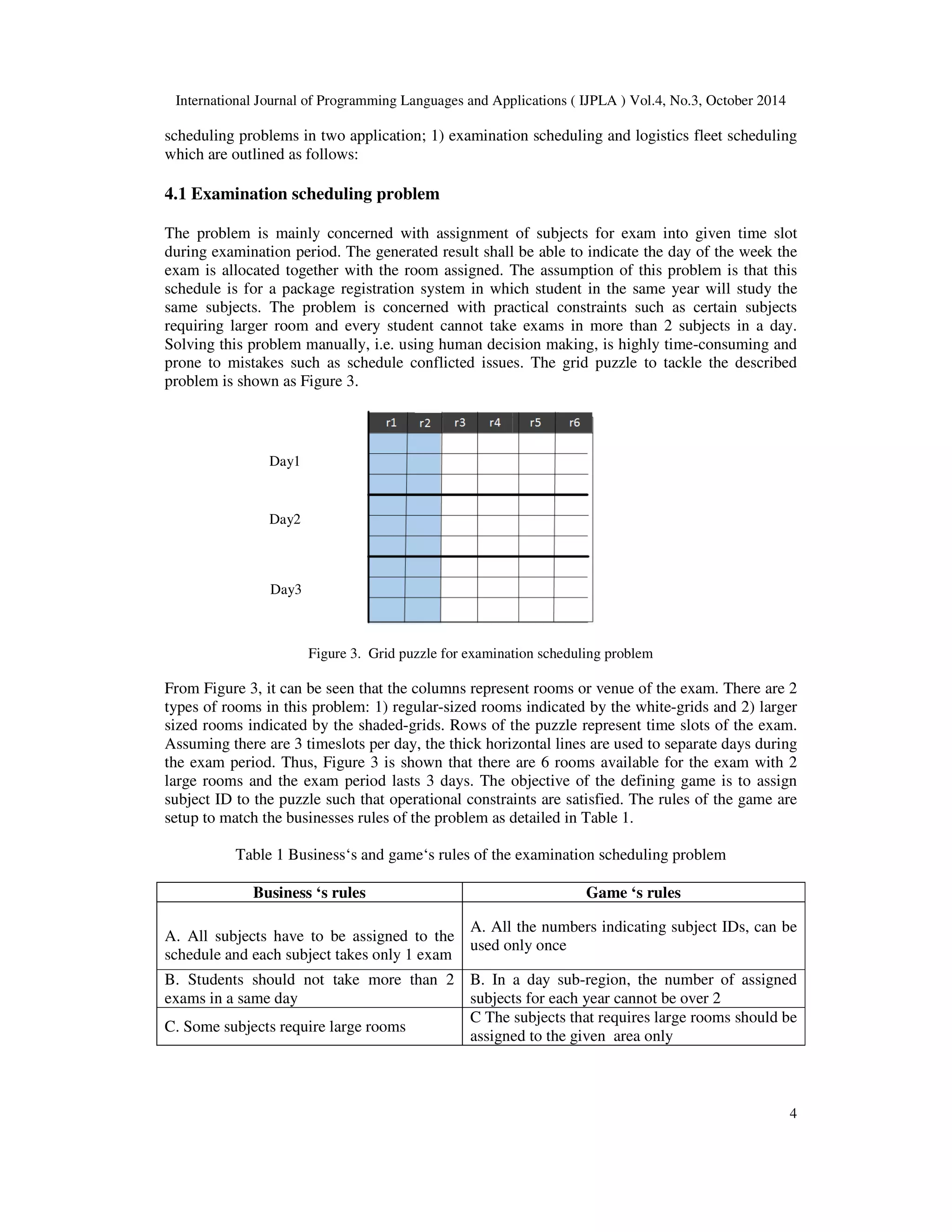
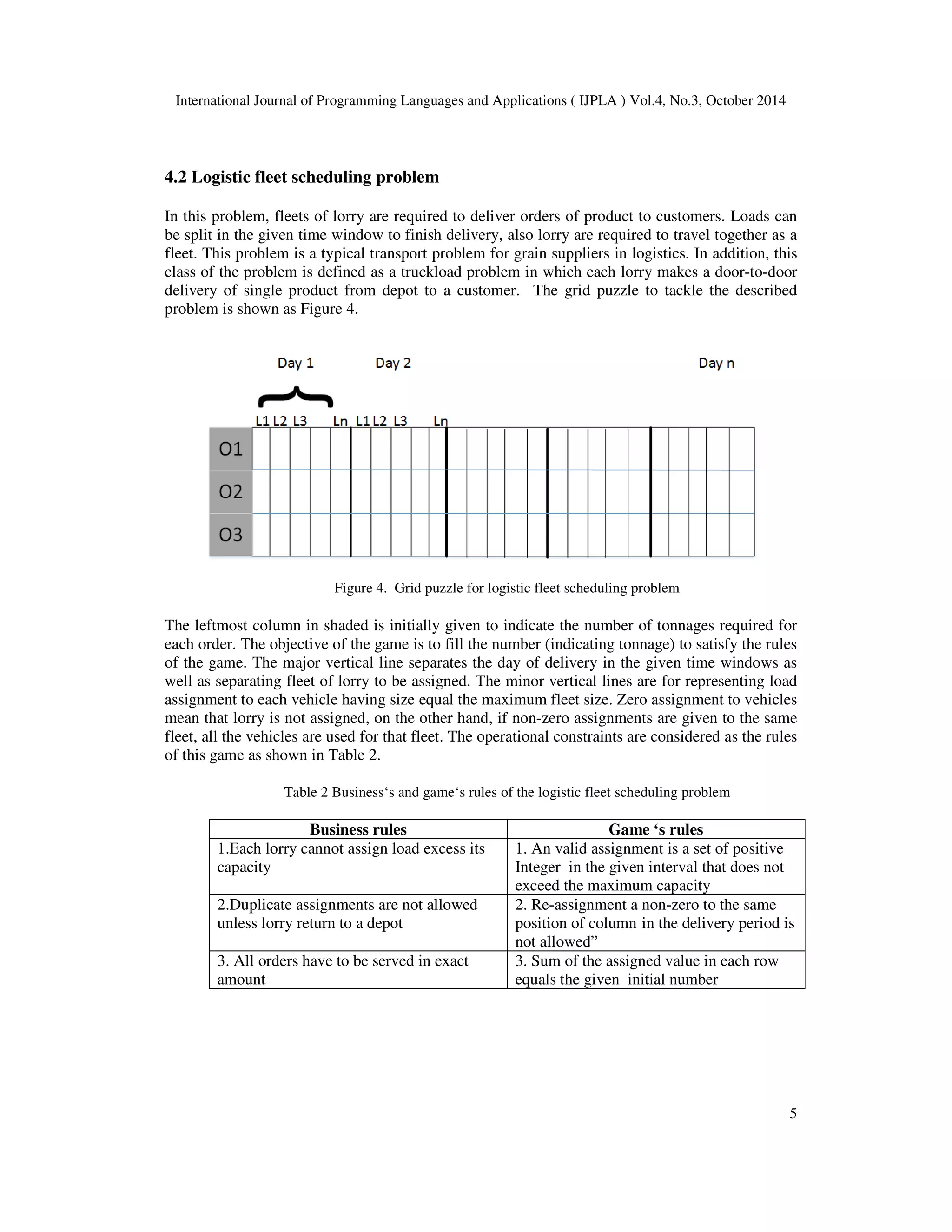
![International Journal of Programming Languages and Applications ( IJPLA ) Vol.4, No.3, October 2014 6 5. IMPLEMENTATION The problems are implemented by using Choco, a Java based CP library. The constraints for examination scheduling and logistic fleet scheduling problems declared in Section 4 as the rules of the games can be solved by CP as follows: 5.1 Examination scheduling problem Implementation details for the examination scheduling are discussed as follows: 5.1.1 “All the numbers indicating subject IDs, can be used only once” Global constraint is a category of constraints that are defined for solving practical problems where association between variables are not limited to ‘local’ consideration[18]. Global constraints are well documented to define 423 constraints in[19]. Globalcardinality is a global constraints used to tackle this requirement. The constraint enable limiting the lower bound and upper bound together with the number of times that those values can be used. Imposing the Globalcardinality constraint to satisfy this rule in Choco is as the following simplified statement. Impose globalCardinality(S,[0,20],all the number in the range except 0 is only assigned 1 time) The representation for this constraint is depicted in Figure 5. In this application, each variable Subject ID (S) = {1, 2, 3, 4…20) represents a sequence of continuous subject ID. A dummy value 0 is required to indicate that there is no assignment given to that timeslot. Therefore, the domain of this variable, i.e. for 20 subjects, is ranged from [0, 20]. The global cardinality is enforced every S, except 0, appearing only once Figure 5. Problem modelling to tackle constraint 5.1.1 5.1.2 “In a day sub-region, the number of assigned subjects for each year cannot be over 2” The model of the year of subject is similar the Subject ID as shown in Figure 6. There are four year of students from 1 to 4. However, similar to the previous constraint, a dummy value (0) is required to indicate a ‘no-assignment’. The domain for this variable is therefore ranged from [0, 4].](https://image.slidesharecdn.com/4314ijpla01-141111030840-conversion-gate01/75/Solving-Scheduling-Problems-as-the-Puzzle-Games-Using-Constraint-Programming-6-2048.jpg)
![International Journal of Programming Languages and Applications ( IJPLA ) Vol.4, No.3, October 2014 7 Figure 6. Problem modelling to tackle constraint 5.1.2 Due to the fact that rows in the puzzle indicate time slot of the exam, Globalcardinality is used to control the number of the domain 1-4 appearing at most twice in each day region. The algorithm for tackling this rules of the defined puzzle is shown in Figure 7. Impose GlobalCardinality(Year, [0,4],all the number in the range except 0 is only assigned 2 time)](https://image.slidesharecdn.com/4314ijpla01-141111030840-conversion-gate01/75/Solving-Scheduling-Problems-as-the-Puzzle-Games-Using-Constraint-Programming-7-2048.jpg)
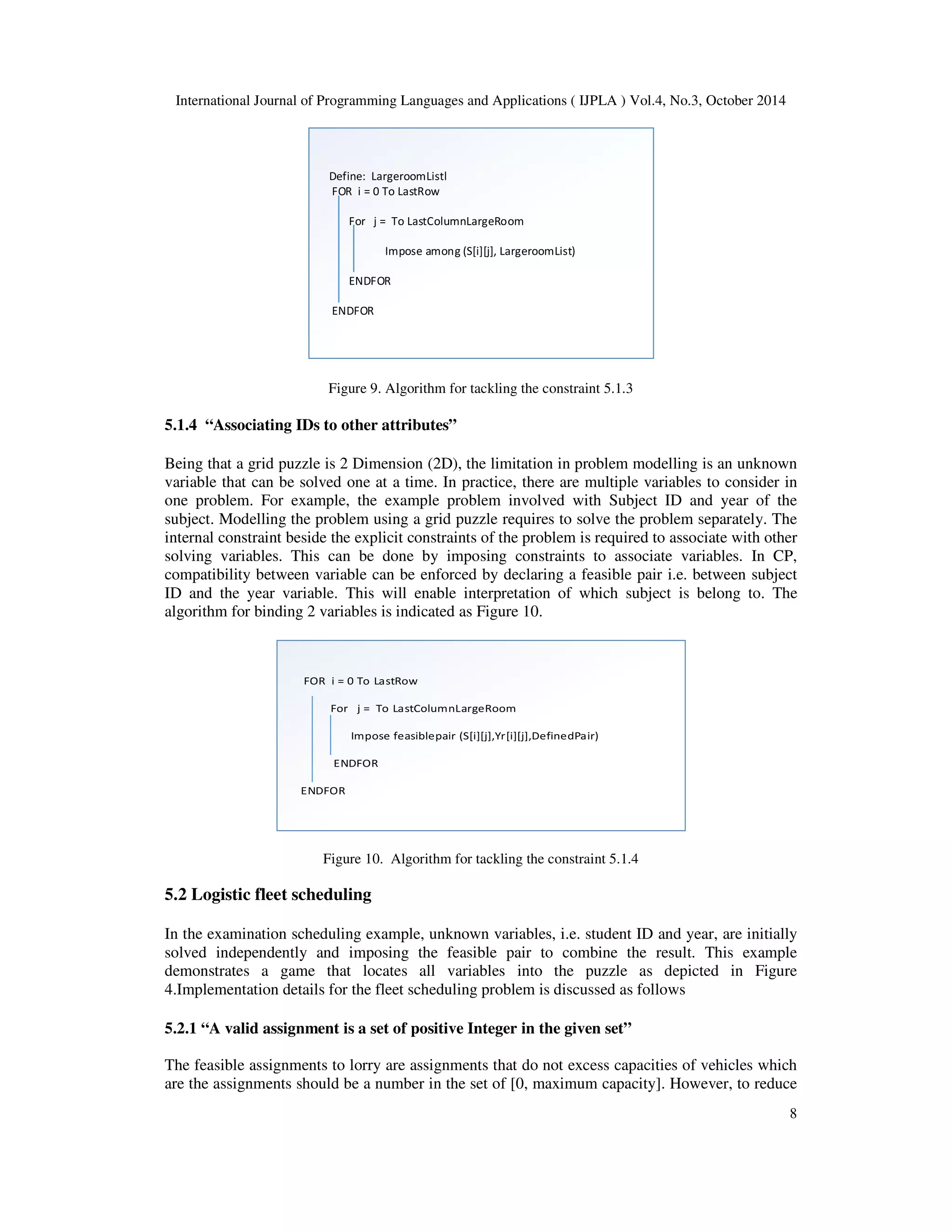
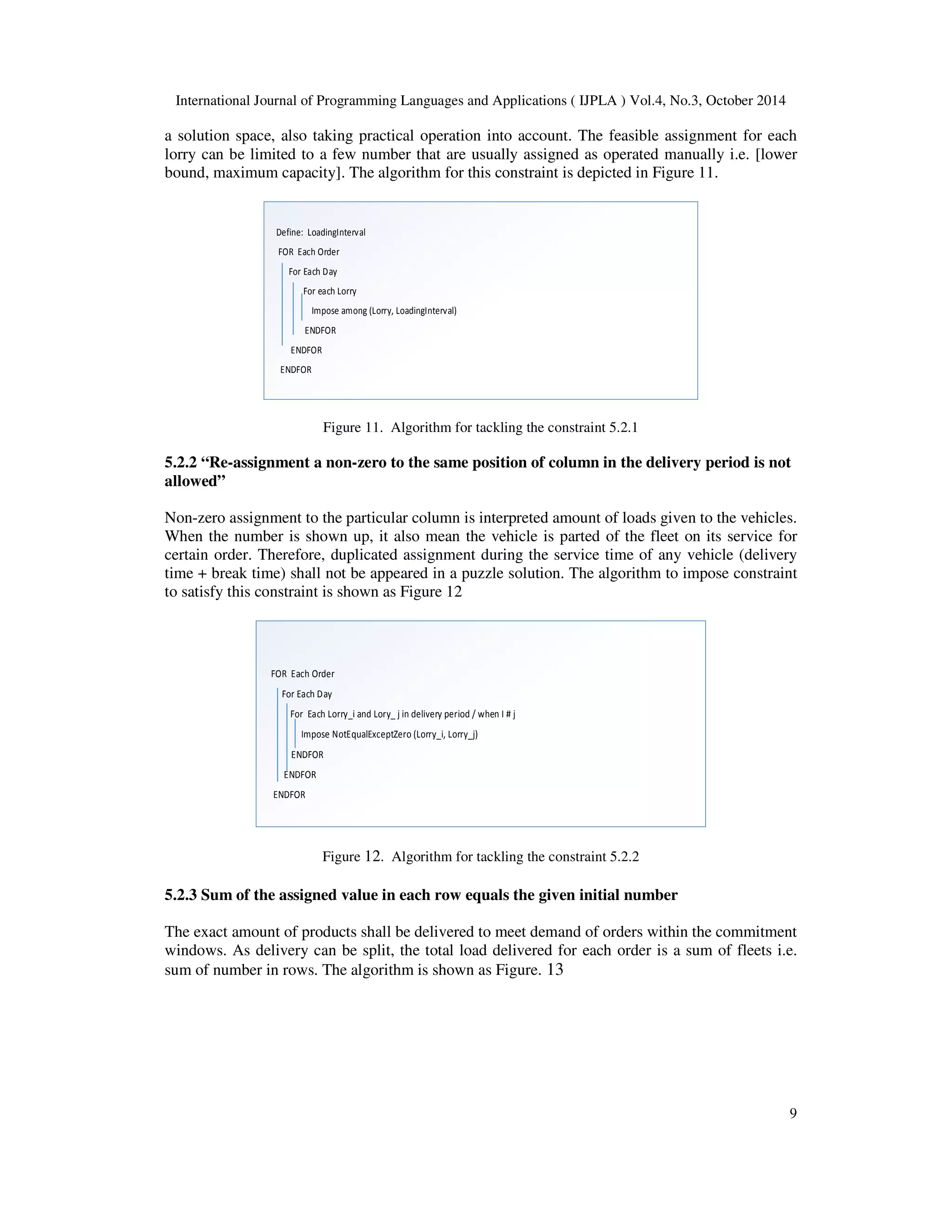
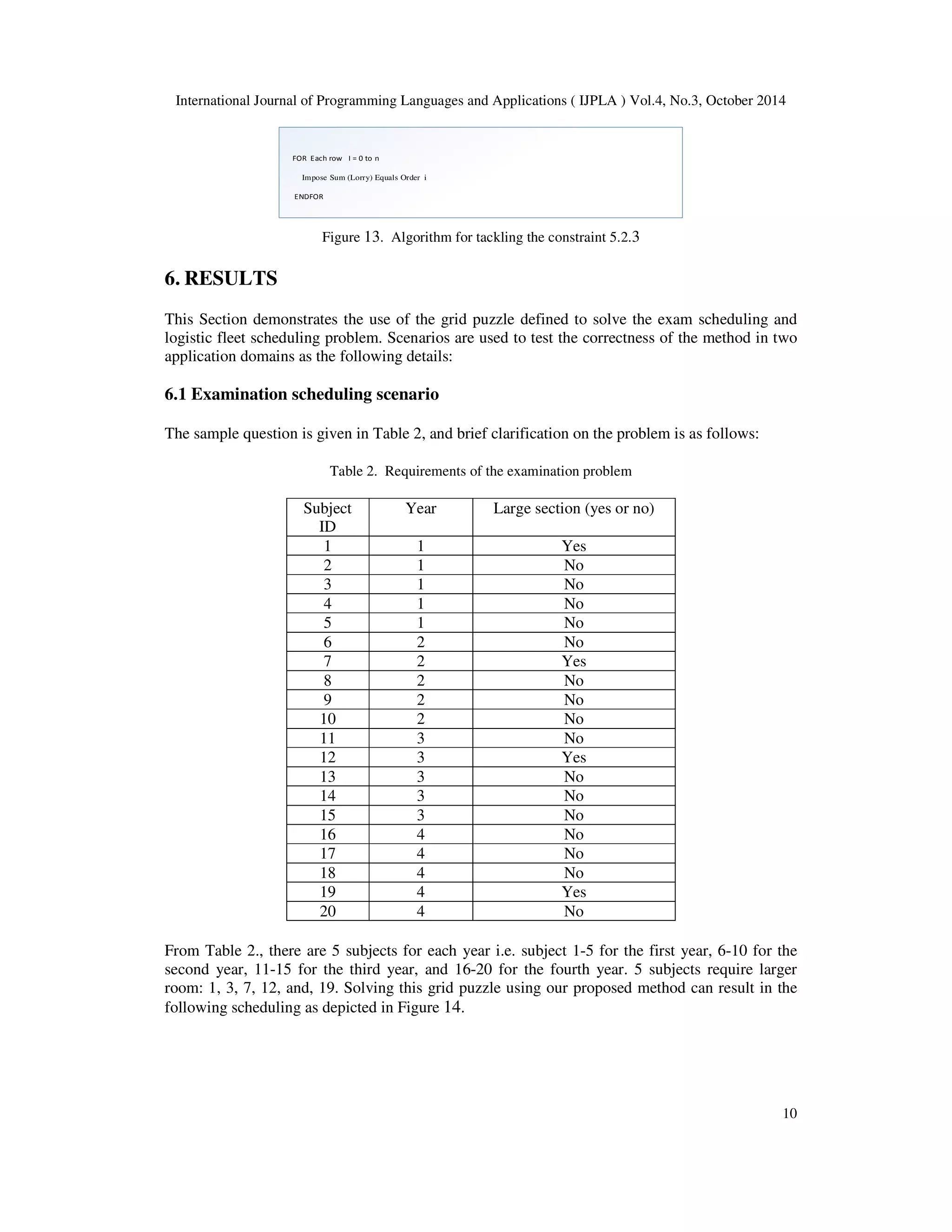
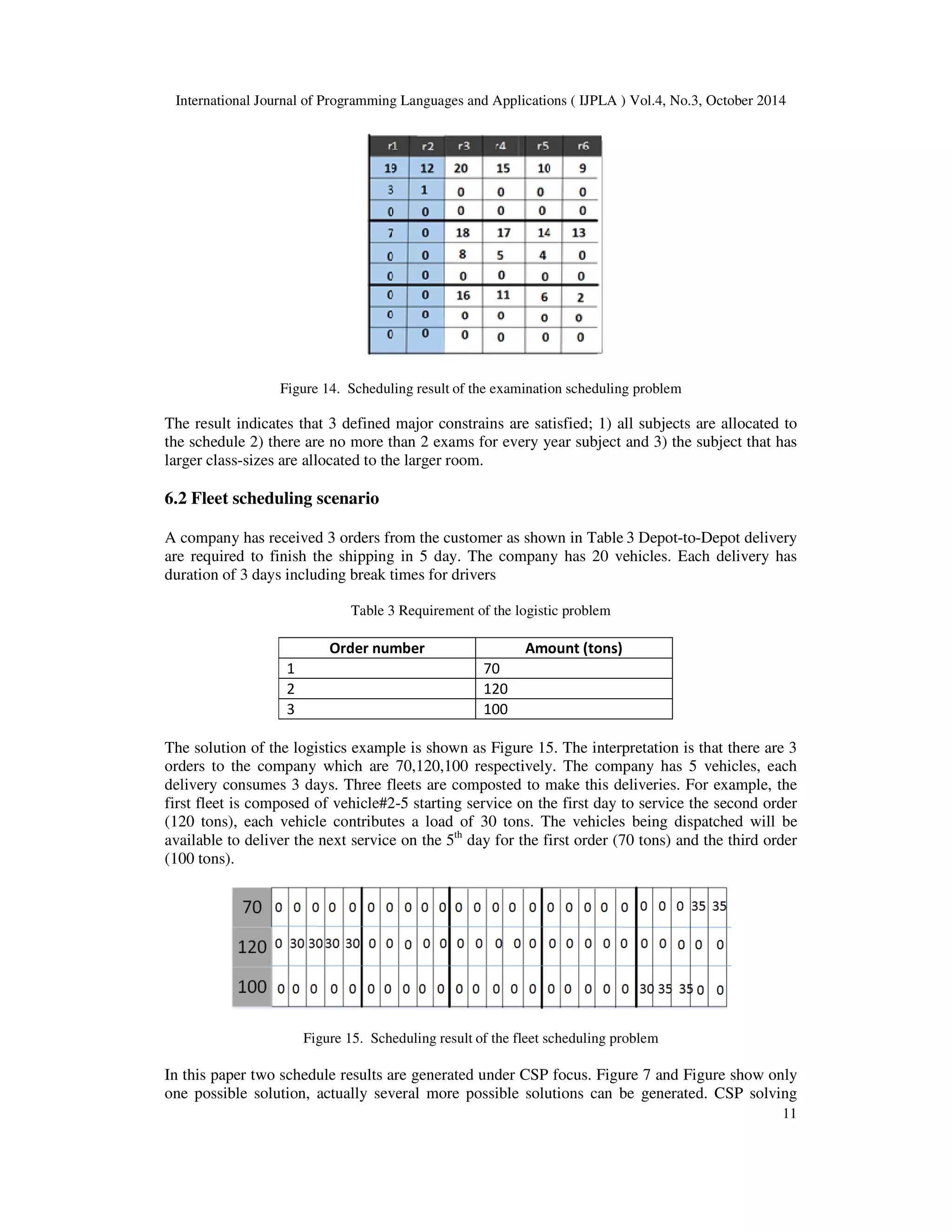
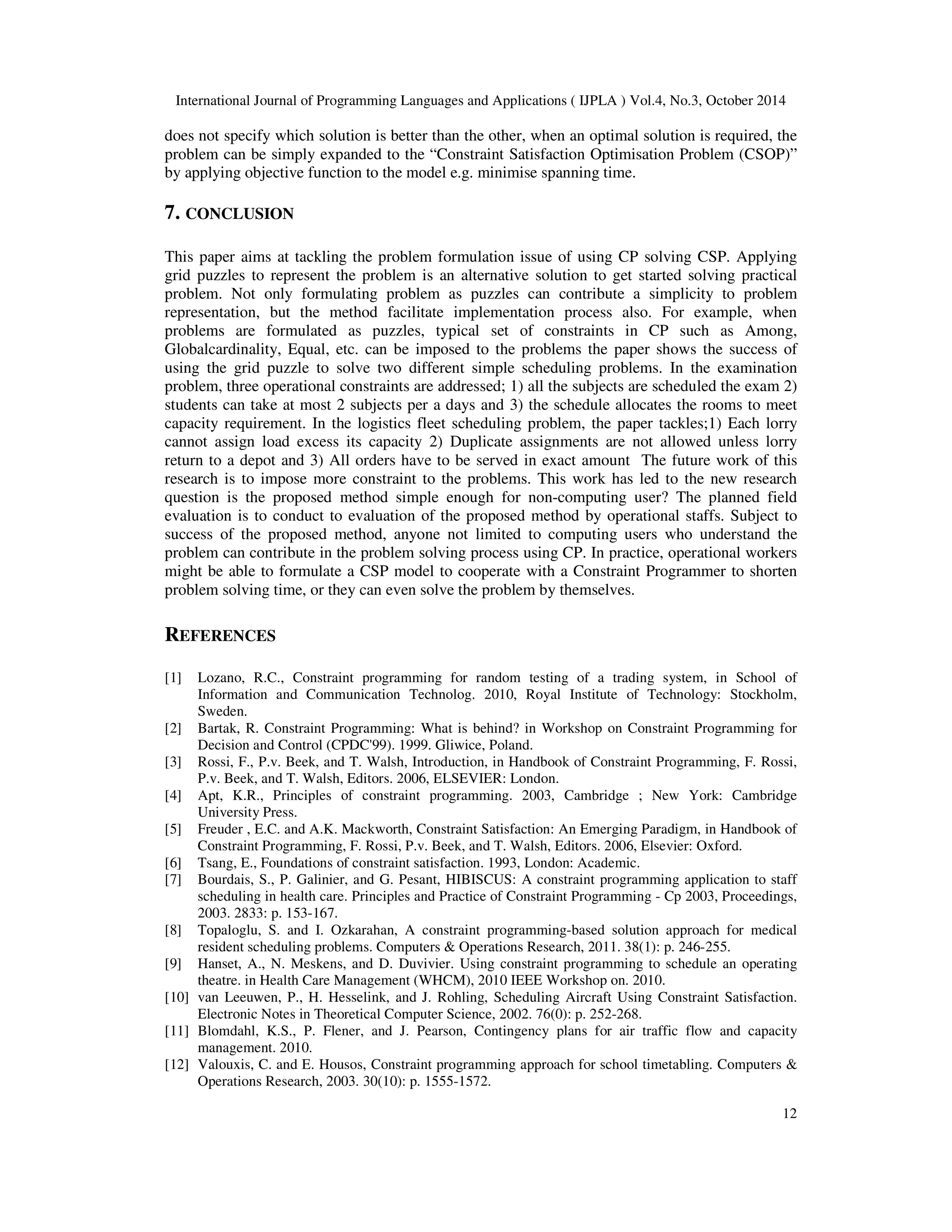
![Figure 10. Algorithm for tackling the constraint 5.1.4 5.2 Logistic fleet scheduling In the examination scheduling example, unknown variables, i.e. student ID and year, are initially solved independently and imposing the feasible pair to combine the result. This example demonstrates a game that locates all variables into the puzzle as depicted in Figure 4.Implementation details for the fleet scheduling problem is discussed as follows 5.2.1 “A valid assignment is a set of positive Integer in the given set” The feasible assignments to lorry are assignments that do not excess capacities of vehicles which are the assignments should be a number in the set of [0, maximum capacity]. However, to reduce](https://image.slidesharecdn.com/4314ijpla01-141111030840-conversion-gate01/75/Solving-Scheduling-Problems-as-the-Puzzle-Games-Using-Constraint-Programming-13-2048.jpg)